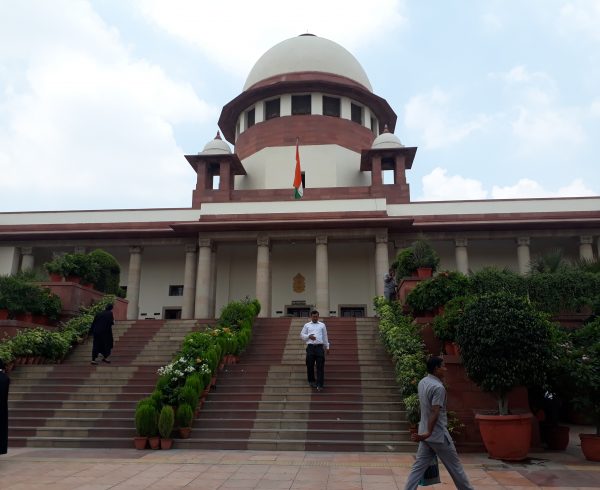BACKGROUND
A
respiratory disease caused by a novel (new) coronavirus that was first detected
in China and which has now been detected in more than 110 countries, including
in India. The virus has been named “SARS-CoV-2” and the disease it causes
has been named “Coronavirus Disease 2019” (“COVID-19”).
On
30.01.2020, the World Health Organization (“WHO”) declared the outbreak a
“public health emergency of international concern”. On 11.03.2020, WHO
characterized COVID-19 as a pandemic. India’s response was initiated on
08.01.2020, much before WHO declared COVID-19 as a public health emergency.
All Indian states were directed for health sector preparedness on 17.01.2020, on
the same day, point of entry surveillance was also initiated. On the directions
the of Prime Minister Modi, on 03.02.2020 a high-level Group of Ministers (GOM)
was constituted to review, monitor and evaluate the preparedness regarding the
management of Novel Coronavirus in the country. As on 13.03.2020, the GoM has
met 6 times so far, guiding, reviewing and monitoring the situation.
SOURCE AND THE OUTBREAK
Coronaviruses are a large family of viruses that are common in people and many
different species of animals, including camels, cattle, cats, and bats. Rarely,
animal coronaviruses can infect people and then spread between people such as
with MERS-CoV, SARS-CoV, and now SARS-CoV-2. The SARS-CoV-2 is a new strain that
was discovered not been previously identified in humans, it appeared in Wuhan,
Hubei Province, China, at the beginning of December 2019.
So
far, there have been more than 1,69,000 confirmed cases and 6,513 deaths. Over
77,000 people have recovered from the illness. The vast majority of the
illnesses were initially in China, but the rate of new cases in China has
slowed. There are now more cases outside of China than in the country. There are
large outbreaks of the disease in multiple countries, including Spain, Italy,
Iran, South Korea, France, Germany, Switzerland etc. There are over 126 people
with confirmed cases of COVID-19 and 2 deaths from the virus in India. The
Undiagnosed number may be much higher, on account of the limited testing
availability in India.
IMPACT ON TRADE AND COMMERCE
Besides the effects on human life, the COVID-19 has the potential to
significantly slow down not only the Chinese economy but also the global
economy. The Indian Government, as well as many other countries across the globe
have imposed quarantine and travel restrictions. At the local, state and
district level-imposed lockdowns, restricting local movement, large gatherings,
the shutdown of Educational Institutions, Cinemas, Commercial Establishments
etc. The Impact of all the above restrictions on business has only started to
manifest but the long-term extent of the same is still uncertain. The impact of
COVID-19 (and the consequent restrictions imposed by governments) is impacting
the ability of businesses in the performance of obligations agreed to in
existing agreements.
In this document, we deliberate how the rules of Force Majeure in legal
contracts and the Theory of Frustration can be exercised in the COVID-19
pandemic. We further recommend measures to be taken by the parties to safeguard
their positions in the changing environment.
FORCE MAJEURE CLAUSES IN CONTRACTS
A force majeure event refers to the occurrence of an event which is
outside the reasonable control of a party and which prevents that party from
performing its obligations under a contract. The Indian Contract Act, 1872 (“Indian
Contract Act”) has no general concept of force majeure (save for the
limited doctrine of contractual frustration). A party’s ability to claim
relief for a force majeure event, therefore, depends upon the terms of the
contract, and the force majeure provision in the same. Force majeure clauses are
express terms and will not ordinarily be implied into contracts governed by the
Indian Contract Act.
Events Capable of Constituting Force Majeure
The test for force majeure usually requires the satisfaction of three
distinct criteria:
(i)
the event must be beyond the
reasonable control of the affected party; and
(ii)
the affected party’s ability
to perform its obligations under the contract must have been prevented, impeded
or hindered by the event; and
(iii)
the affected party must have
taken all reasonable steps to seek to avoid or mitigate the event or its
consequences.
The Event
Many contractual clauses set out a specific list of force majeure events
which are deemed to be events of force majeure beyond the control of the
parties, such as “pandemics,” “epidemics” or “diseases.” A specific reference to
a “pandemic” will make it easier to bring a force majeure claim but will still
require the other tests to be satisfied. However, if the provision does not
include language to that effect, then it will be necessary to consider whether
COVID-19 or its impact on a business or a project, is captured by a different
concept, such as an “Act of God,” “action by government” or a catch-all
provision. Most force majeure clauses contain all-encompassing language in
respect of events which are “outside the reasonable control of the party
affected”.
It is important to bear in mind however that the relevant force majeure
event need not be COVID-19 itself. It is the consequences of COVID-19 and its
impact upon the ability of the affected party to fulfil its contractual
obligations that will be relevant.
The courts have generally construed ‘force-majeure’ clauses narrowly.
Accordingly, unless a particular event falls within the ambit and scope of a
‘force-majeure’ clause, courts may not accept such event as triggering
consequences of ‘force-majeure’. The primary focus, while interpreting such
clauses, ought to be on whether the clause encompasses the type of event a
contractual party claims is causing its non-performance.
The Government of India, vide office memorandum dated 19.02.2020, has
clarified that the spread of COVID-19 falls within the definition of ‘Act of
God’ as a ‘natural calamity’, for the purposes of considering disruption of the
supply chains due to spread of COVID-19. Though this only applies to Government
Procurement of Goods, it does provide guidance towards other government
contracts.
Performance
The second factor would be determined by the degree of impairment in the
capacity of the party involved to meet its contractual obligations owing to the
case of force majeure. A force majeure provision typically relieves a party from
what would otherwise be a breach of contract (i.e. its failure to perform any
obligation, payment of rent dues etc). The party must establish the
correlation between the event and its inability to perform.
A disruption that merely impacts the profitability of a contract may not
be sufficient for a force majeure claim unless there is express contractual
provision for such a situation. Nor would an economic downturn or other general
adverse business conditions likely be considered sufficient, even if it could
clearly be shown that a key trigger for the downturn was COVID-19.
Duty to Mitigate
Finally, a party seeking to rely upon a force majeure provision will
usually have to show that it has taken reasonable steps to avoid or mitigate the
event and its consequence and that there are no alternative means for the
performance of the contract. What constitutes a reasonable mitigation measure is
fact-specific and depends upon the nature and subject matter of the contract in
question.
Notice Requirements
Typically, the affected party’s right to relief for force majeure under
the contract will be conditional upon the issuance of a notice by it to the
other party, supported by the required evidence. The contract may additionally
require the notice to state the anticipated consequences and duration of the
force majeure event. Some contracts include a clause that requires notice to be
provided within a specified period from when the affected party first became
aware of the force majeure event, failure of which will result in a loss of
entitlement to claim Force Majeure.
Consequences of Force Majeure Claims
The consequences for the parties where a valid force majeure event has
occurred will depend on the nature of the affected party’s obligations under the
contract, as well as the consequences and remedies expressly contemplated by the
force majeure clause(s).
Contractual remedies for force majeure typically include an extension of
time to perform those obligations or suspension of contractual performance for
the duration of the force majeure event. If the force majeure event extends over
a longer period, some Clauses may entitle the parties to terminate the contract.
DOCTRINE OF FRUSTRATION
In the absence of an express force majeure clause within a contract,
parties may be able to rely upon the doctrine of frustration, which has been
envisaged under Section 56 of the Indian Contract Act. The doctrine of
frustration is not available if the contract contains an express force majeure
provision since the provision will be regarded as the agreed allocation of risk
between the parties.
The doctrine of frustration will apply if:
(i)
the underlying event is not
the fault of any party to the contract; and
(ii)
the event or circumstance
occurs after the formation of the contract and was not foreseen by the parties;
and
(iii)
it becomes impossible to
fulfil the contract.
The doctrine of frustration results in the contract automatically coming
to an end. The parties to the contract will no longer be bound to perform their
future obligations. The threshold for proving frustration is much higher than
that for most force majeure clauses since it must be shown that the obligations
impacted by the event or circumstance are fundamental to the contract. The
Supreme Court the case of Satyabrata Ghose vs. Mugneeram Bangurn & Co (1954
AIR 44, 1954 SCR 310), considered the principle of Impossibility and held
that ‘impossible’ has not been used in Section 56 of the Act in the sense of
physical or literal impossibility. The performance of an act may not be
impossible but it may be impracticable and useless, and if an untoward event or
change of circumstances upsets the very foundation upon which the parties rested
their bargain, it can very well be said that the promisor finds it impossible to
do the act which he promised to do. Therefore, if the object of the contract is
lost, the contract is frustrated. Furthermore,
If and when there is frustration the dissolution of the contract occurs
automatically. It does not depend, as does rescission of a contract on the
ground of repudiation or breach, or on the choice or election of either party.
It depends on the effect of what has actually happened on the possibility of
performing the contract. What happens generally in such cases is that one party
claims that the contract has been frustrated while the other party denies it.
The issue has got to be decided by the court ‘ex post facto‘, on the
actual circumstances of the case.
It should, however, be noted it is well settled that there is no
frustration where the performance remains physically and legally possible though
commercially unprofitable. The courts have time and again held that mere
commercial impossibility will not excuse a party from performing a contract.
SUGGESTIONS FOR BUSINESS
To be prepared for different scenarios as the situation continues to
unfold, we recommend that all Businesses consider taking the following proactive
steps.
1.
Review your contract(s) to
determine whether the contract(s) include a force majeure provision and, if so:
(i)
Review the definition of
force majeure in the contract to determine whether there is any express
inclusion of events such as COVID-19 and, if not, whether the general language
is sufficient to include COVID-19 and its consequences. If in doubt, seek legal
advice early in the process.
(ii)
Consider the aspects of the
contract that you may not be able to perform and satisfy yourself that the
inability to perform is due to the consequences (direct or indirect) of
COVID-19 and not a different reason.
(iii)
Review what steps you are
taking as a business to avoid or at least reduce as far as possible the effects
of COVID-19 and your ability to continue to perform contracts.
(iv)
Consider whether there are
any notice requirements to trigger a claim of relief, including what type of
supporting documents must be provided and whether there is any time limit for
that notice to be issued.
(v)
Consider what the
consequences of a successful claim for force majeure are.
2.
If there is no Force Majeure
clause in the contract, is there frustration of contract:
(i)
Consider the aspects of the
contract that you may not be able to perform and satisfy yourself that the
Impossibility to perform is due to the consequences (direct or indirect)
of COVID-19 and not a different reason.
(ii)
Though as per the law being
there is no notice required to be given to claim frustration, However, it would
be prudent to notify the opposite party about the situation and the
impossibility to perform.
(iii)
Parties may mutually agree
to extend or waive performance of obligations if not the issues of frustration
will be decided by the court.
3.
Parties Receiving Notices of
Force Majeure:
A party receiving notice of force majeure should carefully examine the
claim to determine:
(i)
if it is consistent with the
scope of protection conferred by the force majeure provision;
(ii)
if the process for giving
notice has been complied with; and
(iii)
whether the relevant
supporting documentation or information has been provided.
(iv)
A party involved in
back-to-back contracts or interrelated contracts will need to take a strategic
approach, taking into account the overall impact of the claim for force majeure
on its obligations under the related contracts.
(v)
A party embedded within a
chain of contracts is involved must also consider whether to issue notices of
force majeure under the linked contracts as a preventive measure.
(vi)
Where different laws govern
back-to-back contracts, the differing interpretations of force majeure under
those laws requires careful consideration.
4.
Parties Making Claims
(i)
A party affected by the
COVID-19 outbreak should take steps to record and document the steps it is
taking to prevent or mitigate the impact of the COVID-19 outbreak on its ability
to perform its obligations under the contract.
(ii)
A party looking to make a
force majeure / Frustration claim should consider carefully how the force
majeure event is framed, and the consequences from that event.
(iii)
A party should only make a
force majeure claim with care, because a wrongful claim could have serious
consequences, including amounting to a breach of contract or a repudiation of
the contract. In such circumstances, the other party may be entitled to claim
damages or to terminate the contract.
AUTHOR
Tarun Mehta (Advocate)
+91 9811551615







Leave a Comment